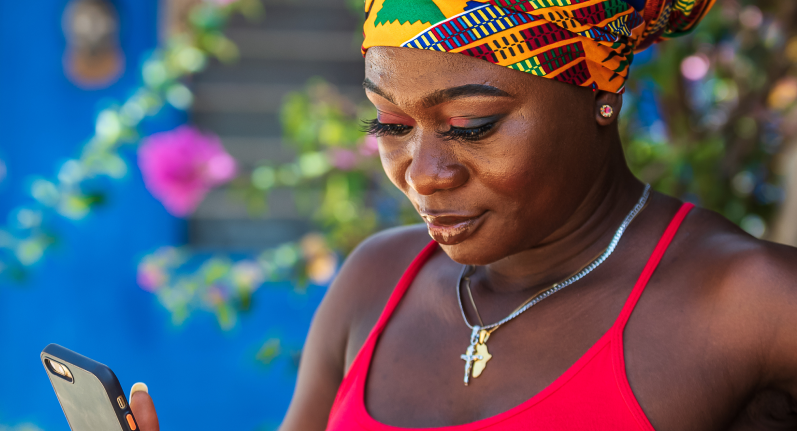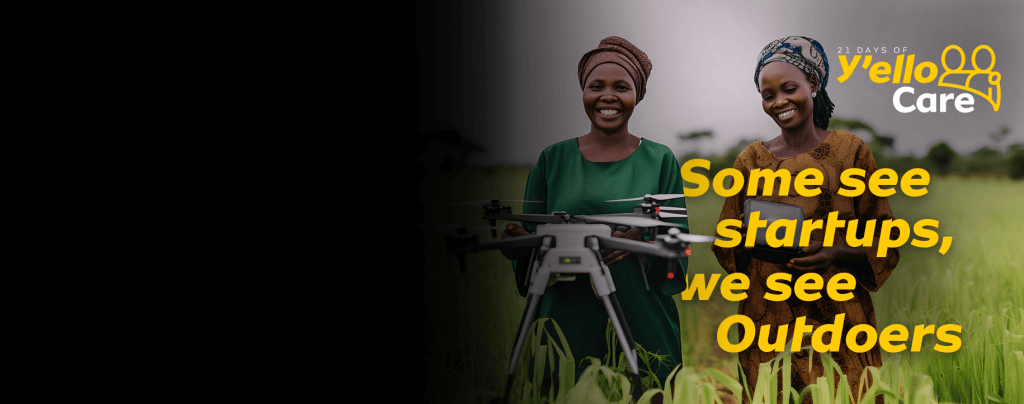
- Home
- About Us
- Sustainability
- Investors
- News
- People & Culture
-
Regions
As digital connectivity expands across Africa, so too does our shared responsibility to ensure that children are safe, informed, and empowered in the online world. While the internet enables young people to learn, connect and grow, it also exposes them to rising threats that can compromise their rights and well-being. Addressing these challenges requires more than policy — it demands intentional collaboration, child-centred design, and decisive action.
MTN is actively contributing to the realisation of the African Union Child Online Safety and Empowerment Strategy by aligning our programmes, safeguards, and partnerships with its core principles. Our approach is rooted in protecting children from harm, amplifying their voices, and working with governments, industry, and civil society to create safe, inclusive digital ecosystems.
We continue to strengthen safeguards across our operations, including blocking access to known sources of child sexual abuse material through third-party tools, supporting law enforcement investigations, and offering confidential public reporting via the Internet Watch Foundation (IWF) portal. In addition, we are deepening awareness and capacity by supporting digital literacy initiatives that equip parents, caregivers, and young users with the knowledge to navigate the online world safely.
But policies and programmes are most effective when shaped with — not just for — young people. That’s why we are committed to supporting platforms and campaigns that centre youth voices and lived experiences, while working with stakeholders to embed these perspectives in policy, education, and digital innovation.
MTN’s position on child online protection

Explore key insights from the GSMA-MTN Ministerial Roundtable on Child Online Protection (COP) in Sub-Saharan Africa, held at MWC 2025. The whitepaper highlights the urgent need to integrate COP into digital strategies, drawing on new research from MTN and Ipsos on youth online behaviour. It offers practical recommendations for governments, tech companies, and civil society to collaborate for a safer digital future.
Enhancing Child Online Protection in Sub-Saharan Africa
As part of its Help Children Be Children initiative, MTN Group commissioned new research with IPSOS to better understand the online experiences of children in Nigeria, South Sudan, and Zambia. The findings reveal urgent challenges, including high levels of cyberbullying, exposure to harmful content, and rising mental health concerns among youth.
Online child safety: African Insights
Zambia Let Children Be Children
Nigeria Let Children be Children
South Sudan Let Children Be Children
We encourage our stakeholders to take personal responsibility for upholding the Group’s ethics, but we also have formal structures in place to assist with compliance.
While the Group’s Chief HR & Corporate Affairs Officer is responsible for ethics management, the Social & Ethics Committee is responsible for ethics governance. Ethics task teams also work with certified and registered ethics officers across our operating companies.
The Group’s operations span diverse legal, socioeconomic and cultural contexts. This poses both opportunity and risk-based challenges to how we do business.
Globally, ICT is a catalyst for socioeconomic development. But the benefits of the rapid development of technology must be balanced with ethical and responsible application.
Wherever we operate, we adhere to sound ethical business conduct that generates economic value for our stakeholders and communities in an environmentally responsible and sustainable way.
This is a report of the Independent Special Committee appointed by the Board of MTN Group Limited (“the board”) to investigate allegations by Turkcell against MTN (“the committee”).
The committee was established by resolution of the board on 1 February 2012 and asked to conduct an enquiry in accordance with the terms of reference.
The primary objective of the committee was to investigate the factual allegations of wrongdoing in the draft complaint that Turkcell raised in 2012 and advise and make recommendations to the board as to any actions to be taken in connection with those findings.
Irrespective of the validity of the claims which Turkcell sought to advance, the board felt that the nature and content of Turkcell’s allegations raised serious issues requiring thorough investigation and analysis. MTN has zero tolerance for corrupt and unethical business practices. To ensure the independence of the investigation the committee was comprised of three non-Executive Directors but importantly was chaired by Lord Hoffman a pre-eminent Jurist and member of the House of Lords in the United Kingdom.
Lord Hoffman confirmed that he received full cooperation from the company and was given unrestricted access to all individuals, information, documents and facilities which the committee requested. He said that there had not been the slightest attempt by the Company or its management to influence the committee in its deliberations or its report.
The committee exonerated MTN and found that Mr Kilowan who had given two statements in arbitration proceedings brought by Turkcell against the Islamic Republic of Iran and a deposition in the United States proceedings against MTN was in the words of the committee “shown to be a fantasist and a conspiracy theorist”.
The committee was entirely satisfied that there was no conspiracy between MTN and Iranian officials to remove Turkcell from the successful consortium, no promise to procure the South African government to supply defence equipment or support Iran’s nuclear policy at the IAEA, and no sham loans. The committee further found that MTN paid nothing to Ambassador Saloojee and that neither Mr Nhleko nor Ms Charnley authorised Mr Kilowan to promise him anything. Finally the committee found that there was no substance in the allegations of participation by Mr Nhleko or Mrs Charnley.
The King Report on Governance for South Africa 2016 (King IV) recommends that the governing bodies of organisations “should lead ethically and effectively”. The report further states that the “governing body should govern the ethics of the organisation in a way that supports the establishment of an ethical culture”. MTN has adopted a framework for the governance and management of ethics that incorporates the guidance given by King IV on ethics programmes.
In MTN, ethics management refers to our collective efforts to create and maintain a strong ethical culture. This culture is marked by ethical leadership, ethics awareness, ethical decision-making and sustained ethical behaviour.
Our efforts to strengthen our ethical culture include the following
As role models of ethical behaviour to all our stakeholders, our Board members understand and are competent in and fully committed to ethics management, and sponsor and actively support ethics management interventions.
Our ethics governance structures comprise a Group Board Social and Ethics sub-Committee and a Board-level subcommittee in each operation, responsible for the governance of ethics at OpCo level. These structures set the strategy and policies guiding MTN’s ethics performance, and they exercise oversight of and report on MTN’s ethics performance to our stakeholders.
The executive management of MTN ensured that each operation has an ethics office and an operational ethics committee to effectively manage ethics. As part of MTN’s efforts to strengthen our control and compliance environment, a revised second and third line assurance model has been implemented. This assurance model provides for a clear separation in the three lines of assurance within MTN, i.e.
The ethics function across the group in particular is benefitting from the strengthened control and compliance environment as dedicated management staff in Risk and Compliance now have ethics management as a core part of their portfolios.
These structures and people oversee and implement our key ethics management processes.
The governance structure and leadership oversee and implement our key ethics management processes:
We conduct an ethics risk assessment every three years to help us understand our ethics risk profile. This enables us to follow the King IV recommendation that the governing body should ensure that codes of conduct and ethics policies address the key ethics risks of the organisation.
MTN Group and each OpCo has a strategy and plan for managing ethics, which enables us to meet the King IV recommendation that the governing body should assume responsibility for the governance of ethics by setting the direction for how ethics should be approached and addressed by the organisation.
Through our code of ethics and ethics-related policies we ensure that the risks we have identified are addressed and opportunities harnessed. We also refresh our organisational values from time to time as necessary. In this way we strive to meet the King IV recommendation that the governing body should approve codes of conduct and ethics policies that articulate and give effect to its direction on organisational ethics.
Our ethics management strategy and plan is implemented over the course of two to three years to ensure that everyone in the MTN consistently acts in line with our values and standards. We make ethics real through a number of initiatives implemented across our OpCos:
The MTN Group ethics office reports to the Group Board Social and Ethics subcommittee on progress with the ethics management plan as well as the state of ethics in MTN, in line with the King IV recommendation that the governing body should ensure that measures are taken to monitor organisational ethics and how the outcomes are addressed.
MTN’s ethics management processes are assessed independently by Internal Audit. We report on our ethics performance to our external stakeholders in our integrated sustainability and annual reports, as well as to international independent standards organisations that help us understand and communicate our impact on our ethical culture.
With operations spanning the Middle East and Africa, we comply with local regulations and international laws. Our Social & Ethics Committee reviews our Code of Ethics regularly, keeping it up to date with global best practice. We expect our suppliers and partners to share the same ethical standards as our employees.
We conduct our business affairs with honesty, integrity, diligence, and professionalism. We believe this leads to success.
We do business in full compliance with the laws of each country we operate in, including:
We have set out a number of ethical policies to enhance business governance and guide business conduct. Download our policy positions here.
We take our responsibilities and obligations to the company seriously, and the Group has processes in place to help us identify and manage any potential conflicts of interest .
Effective and transparent corporate governance keeps our business in line with global best practice, and helps us maintain and conserve our physical, financial and intellectual resources while maximizing shareholders returns.
The Group maintains accurate and complete records in accordance with all applicable laws. We adhere to King IV and follow International Financial Reporting Standards in compiling annual financial statements.
We also have controls in place, through institutions and dedicated management positions, to help us assess and manage risks to the business and to our people.
We respect our customers’ right to privacy. They entrust us with their personal information, and it’s our duty to protect it. We owe our customers professional service that’s fair and courteous, and high-quality products that meet or exceed their expectations.
Selected through a transparent process based on objective criteria and evidence, our vendors and suppliers must uphold our ethical principles and comply with local and international laws.
We support and respect human rights in our workplace. This includes providing a safe and non-threatening workplace where healthy working conditions are maintained, where all people are treated with respect and with due regard for their dignity, and where harassment and intimidation are not tolerated.
We guarantee freedom of association, ensure non-discrimination in personal personnel practices, and make reasonable accommodation for all employees’’ religious observations and practices.
We respect our employees’ privacy and the confidentiality of the personal information.
We maintain transparent, ethical relationships with governments, their agencies, officials and personnel.
Business communications are honest, accurate and timeous. We never comment unfavourably on our competitors products, management or operations.
Contributing to socioeconomic development is important wherever we operate. We support democratic institutions, engage NGOs and policy groups, and find ways to uplift local communities. We’re compliant with all environmental laws and hold ourselves accountable to the UN Global Compact on human rights, labour standards, environmental responsibility and anti-corruption. We also follow the Global Reporting Initiative’s Guidelines on sustainability reporting.
At all times we are professional and competent, respect the traditions and culture of all people, and refrain from behaviour that’s offensive, intimidating, malicious or discriminatory.
This is a report of the Independent Special Committee appointed by the Board of MTN Group Limited (“the board”) to investigate allegations by Turkcell gainst MTN(“the committee”).
The committee was established by resolution of the board on 1 February 2012 and asked to conduct an enquiry in accordance with the terms of reference.
MTV Base, Africa’s leading youth and pop culture platform, has partnered with MTN Group to launch Room of Safety — a bold new digital series created to raise awareness among young Africans about internet safety and responsible online behaviour.
Premiering on the 20th of July, the 10-part short-form series will air across MTV, MTV Base, and MTV’s social media platforms. Room of Safety features voices from Paramount’s Culture Squad alongside influential young African creators and content leaders. Together, they unpack online threats like cyberbullying, harmful content, and manipulative digital behaviours — all while equipping youth with the confidence and tools to take action.
One click can change a life. Let’s make it count — by choosing safety, speaking up, and staying informed.
While the internet offers endless opportunities to learn, connect and grow, it can also be misused in ways that cause harm — especially to children. At MTN, through our Help Children Be Children programme and the Room of Safety campaign, we are committed to making digital spaces safer for Africa’s youth by ensuring that accessible, reliable support channels are available in every country.
Working in partnership with governments, law enforcement, civil society, and global experts like the Internet Watch Foundation (IWF), we support a growing network of national and continental reporting platforms.
These platforms enable the public to confidentially and anonymously report child sexual abuse material (CSAM) or harmful online content — and in doing so, help protect children from further exploitation.

Be part of building a safer internet for Africa’s children. See below for reporting platforms available in your country and across the continent.
In today’s fast-evolving digital world, young people are growing up in an environment where AI companions, social platforms, and constant connectivity shape how they learn, connect, and explore their identities. As these technologies become more embedded in daily life, the importance of equipping youth—and those who support them—with the tools to stay safe online cannot be overstated.
Creating safe digital spaces starts with access to information, open and healthy conversations, and cross-generational collaboration. Whether you’re a young person making sense of the online world, a caregiver supporting a child, or a law enforcement officer responding to digital threats, the resources below are designed to provide practical, accessible guidance to help protect and empower youth across Africa and beyond.

As children increasingly interact with AI-driven chatbots and virtual companions, new risks are emerging. These tools may appear helpful or entertaining, but they often collect and process personal information—such as interests, emotions, and behavioural patterns—without full transparency. This can lead to emotional over-reliance, manipulation, or unintended exposure to harmful content.
Understanding how AI systems work, and helping children engage critically and cautiously, is essential.
UNICEF: How to Keep Your Child Safe Online
Offers clear, practical suggestions for caregivers on setting boundaries, managing screen time, and encouraging open conversations.
Unicef: AI and Children’s Rights
Outlines how AI can influence children’s rights, privacy, and mental health, with guidance for families and policymakers.
Online interactions can sometimes blur the line between playful teasing and harmful behaviour. For young people, learning to identify the signs of cyberbullying—such as exclusion, persistent mockery, or threatening messages—is crucial. Equally important is knowing how to respond, when to speak up, and who to turn to for help.
UNICEF: Cyberbullying – What It Is and How to Stop It
Explains the forms cyberbullying can take and provides tools for recognising and dealing with it early.
Children are often exposed to violent, sexual, or otherwise age-inappropriate content online—sometimes by accident, sometimes through manipulation. Such experiences can influence their mental health, worldview, and self-perception, particularly if they are not given the opportunity to process what they’ve seen in a safe, trusted space.
UNICEF: Drawing the Line in Digital Spaces
A report that explores how youth experience digital spaces and how caregivers and mentors can help them set healthy boundaries.
UNICEF: Digital Wellbeing Guide
Shares tips to promote emotional balance, healthy screen habits, and supportive relationships.
Social media can be a powerful tool for expression—but it can also create intense pressure to conform, perform, and constantly compare. Helping young people build digital resilience and media literacy is key to countering these pressures.
UNICEF: Drawing the Line in Digital Spaces
A report that explores how youth experience digital spaces and how caregivers and mentors can help them set healthy boundaries.
UNICEF: Digital Wellbeing Guide
Shares tips to promote emotional balance, healthy screen habits, and supportive relationships.
Oversharing online is a common risk for young users. Teaching digital consent, privacy awareness, and critical thinking about what is shared online is a shared responsibility.
UNICEF: Privacy Checklist for Parents
A printable guide for parents to review essential safety checks with their children.
ICMEC: Digital Safety Resource Hub
Provides printable tip sheets and learning tools for preventing early exposure to harmful content.
Being constantly connected can take an emotional toll on young people—leading to fatigue, stress, and burnout. Encouraging mental wellness, setting digital boundaries, and creating safe offline spaces are all part of building emotional resilience.
UNICEF: Digital Wellbeing Guide
Shares tips to promote emotional balance, healthy screen habits, and supportive relationships.
Child Helpline International: Resources
A hub of guides for responding to online abuse and mental health crises, tailored for caregivers and child protection professionals.
The internet can connect young people to new communities, but it can also open doors to deceptive and dangerous individuals. Catfishing, scams, and grooming often begin with fake identities and false trust. Recognising red flags early and knowing how to report or exit unsafe interactions is key to preventing real-world harm.
ICMEC: Digital Safety Resource Hub
Provides printable tip sheets and learning tools for preventing early exposure to harmful content.
UNICEF: Child Safety Online
Highlights real-world challenges and strategies for supporting children after exposure to disturbing content.
Creating safer digital spaces is a collective effort. Whether you’re a friend, sibling, teacher, or parent, being a digital ally means standing up against harmful behaviour, supporting those affected, and modelling kindness online. Small actions like listening, sharing safety tips, or simply checking in can make a powerful difference.
IWF: Talk, Trust, Empower (PDF)
Offers practical conversation starters and behavioural cues to help families build trust and digital safety skills.
ICMEC: KidzLive Interactive Booklet (PDF)
A colourful, interactive booklet that teaches younger children to protect themselves using stories and activities.
Creating safer digital spaces is a collective effort. Whether you’re a friend, sibling, teacher, or parent, being a digital ally means standing up against harmful behaviour, supporting those affected, and modelling kindness online. Small actions like listening, sharing safety tips, or simply checking in can make a powerful difference.
Child Helpline: Tips for Helping a Child in Crisis
Offers brief, actionable advice for parents and professionals supporting children facing online abuse or emotional distress.
UNICEF: How to Keep Your Child Safe Online
Offers clear, practical suggestions for caregivers on setting boundaries, managing screen time, and encouraging open conversations.
Change begins with commitment. By pledging to be more aware, responsible, and supportive online, young people and adults alike take a vital step toward restoring trust and dignity in digital spaces. Standing together—across generations and communities—we can shape a safer internet for everyone.
Unicef: AI and Children’s Rights
Outlines how AI can influence children’s rights, privacy, and mental health, with guidance for families and policymakers.
UNICEF: Child Safety Online
Highlights real-world challenges and strategies for supporting children after exposure to disturbing content.
The SESC performs a monitoring role to ensure that MTN’s business is conducted in an ethical and properly governed manner. The Committee assists the Board with creating shared value through responsible environmental, economic, social and governance business practices across MTN’s operating markets. During 2021, the SESC approved our Sustainability Strategic Framework, outlining key performance indicators and linking executive remuneration to ESG targets.

21 Days of Y’ello Care As the restrictions on COVID-19 have been lifted, the numbers of beneficiaries reached has decreased as most Opcos moved back to face-to-face interventions. This has resulted in more focused engagements with beneficiaries, and a greater lasting impact on their lives. 2022 brought back the Y’ello Care initiatives, providing a mechanism for employees to once again engage with community projects in a more hands-on manner. Overall employee engagement also increased with the reduction in COVID-19 protocols, meaning our MTNers had more opportunities to work closely within the communities in which they operate.
